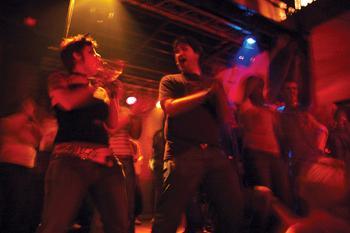Bars around Baton Rouge are encouraging students to “get up offa that thing and dance ’til you feel better.”
The Varsity Theatre, which holds Retro Active on Saturday nights, and Spanish Moon, which holds Star 80 on Thursday nights, both feature music from the 1980s.
A new addition to the scene is Classic Soul Night, which has been held Thursdays at Red Star Bar since June. It features music from the ’60s and ’70s.
Red Star owner Frank McMains described the night as “classic soul for the people.”
The creators of Classic Soul Night said the idea came from the music they listened to as children.
“It was born out of my lifelong attachment to the great soul sounds that I grew up around,” McMains said. “My mother was a Motown fan, and my dad loved classical music – but Bach tends to clear a bar.”
The music at Classic Soul Night features some of the most popular artists from the decades.
“[Classic Soul Night plays] heavyweights such as Aretha Franklin, Otis Redding, James Brown and Al Green but also a fair amount of rare and overlooked stuff,” said Michael Pinter, sound engineer and DJ at Red Star.
The event has grown in popularity since its summer inception, and Pinter said there has been a loyal following. People have not started dressing up in retro clothes for the event, Pinter said, but “we can only hope.”
Though most college students were not born at the time of this type of music’s popularity, Pinter said there is still a familiarity to the songs that draws people to the dance floor.
Other bars in the Baton Rouge area have been holding dance nights featuring music from various decades for a long time.
Brent McLellan, general manager of The Varsity Theatre, said Retro Active, which has been occurring since The Varsity opened 16 years ago, does not focus on one particular decade.
“Our DJs start off the night in the ’70s, work their way through the ’80s and ’90s and are pretty current with mainstream favorites by the end of the evening,” McLellan said. “With Retro Active, we are simply providing a night of entertainment that appeals to all, that is extremely popular and well-attended week in and week out.”
Nights featuring music from the ’60s, ’70s and ’80s are popular in the area, but some people said music from the ’90s will not lend itself to a “decade dance night.”
“For some reason, I don’t see the music of the ’90s inspiring the same kind of lasting devotion as the decades before it,” Pinter said. “But then again, I wasn’t a kid in the ’90s.”
But McMains said music from the ’90s will not fade from public interest.
“I think [’90s music] was really influential in a lot of ways, in really significant ways,” McMains said. “Bands like Nirvana were incredibly influential on modern music.”
McMains said he can see why bars that have ’80s nights are so popular.
“You could look at something like ’80s Night at the Spanish Moon,” McMains said. “It’s a real good example … [the majority of people there] were alive in the 1980s, but they weren’t buying records and listening to the radio. That period of music has been able to generate significant nostalgic interest.”
Students cited different opinions on the popularity of music from decades past.
“History repeats itself over and over again,” said Yvonne Mariki, mathematics junior. “That’s why the same trends are coming back. People always reach back to the past to grab something new that’s really old. All the styles and stuff that we have today are pretty much old stuff.”
Demetra Andrepont, geography senior, said an affinity for older music goes hand in hand with college life.
“When people get into college, they actually draw closer to their family members, like their parents,” Andrepont said. She said students often pick up on influences from their parents, including their taste in music.
David Smyth, University professor and coordinator of music theory, said music from the ’60s and ’70s is still popular with students because it has universal themes to which everyone can relate.
“Classic soul from the ’60s and ’70s was simply wonderful music, and it carried a message many of us can still identify with today,” Smyth said. “I heard this music on the radio when I was growing up, but it does not surprise me at all that many people who did not can still appreciate it.”
Smyth said students recognize the talent of these singers.
“Performers like Aretha Franklin, Isaac Hayes, Ray Charles and groups like The Supremes were truly amazing talents – real American treasures,” Smyth said. “Students today probably recognize this, even if they don’t necessarily understand the social and political position this music originally occupied.”
—-Contact Sarah Aycock at saycock@lsureveille.com
Red Stick bars feature oldies for newbies
September 11, 2007




